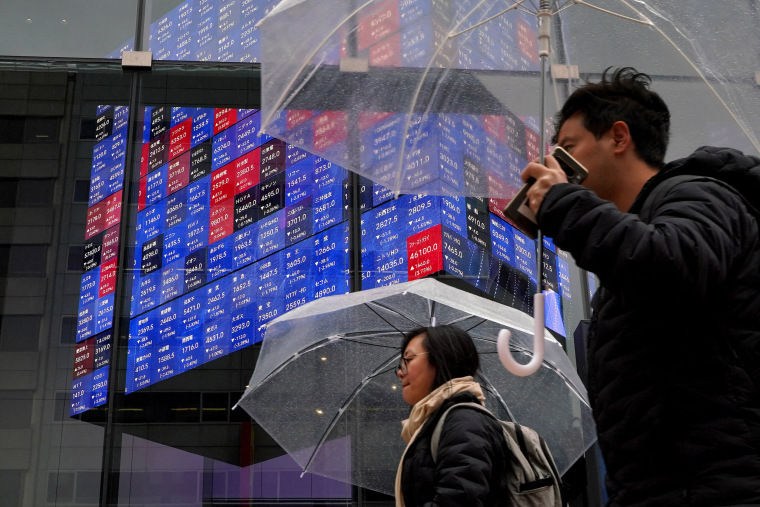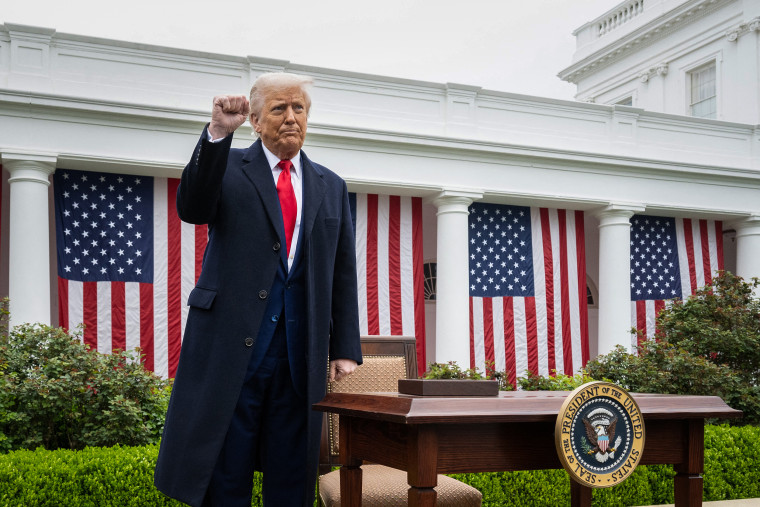World stock markets and oil prices tumbled and investors dashed to the relative safety of bonds, gold and the yen Thursday, as President Donald Trump’s drastic U.S. trade tariffs stirred widespread fears of a global recession.
A new baseline 10% tariff on imported goods plus some eye-watering additional ‘reciprocal’ tariffs on countries Trump said put high trade barriers on the U.S., left traders clearly rattled.
In Europe, where the 27 country EU bloc now faces a 20% reciprocal levy, bourses lurched between 1.3% and 2% lower early on as Brussels and other capitals in the region were left in uproar.
Tokyo’s Nikkei index had slumped 2.7% in Asia overnight to leave it on course for its worst week in nearly two years. Wall Street futures were down 3%, while the U.S. dollar dropped more than 1% to a six-month low.

Analysts at JPMorgan said the tariffs were, “significantly higher than the realistic worst-case scenario” they have been envisaging.
Credit rating agency Fitch warned they were a “game-changer” for both the U.S. and global economy, while Deutsche Bank called them a “once-in-a-lifetime” event that could easily knock between 1%-1.5% off U.S. growth this year.
“Many countries will likely end up in a recession,” Fitch’s Olu Sonola said. “You can throw most forecasts out the door if this tariff rate stays on for an extended period of time.”
The scramble for ultra-safe government bonds that provide a guaranteed income drove U.S. Treasury yields down towards 4% and the yield on 10-year Germany bonds, the European benchmark borrowing rate, went 8.5 basis points lower to 2.64%.
The sweeping tariffs will raise effective import taxes in the world’s largest economy to the highest levels in a century. If they do trigger recessions, central banks around the world are likely to slash interest rates which benefits bonds.
Nasdaq futures were down 3.2% ahead of what was expected to be a turbulent U.S. restart.
Apple’s market capitalization had dropped by more than $240 billion as its shares slid 7% in after-hours trade on Wednesday. Nvidia’s market cap dropped 5.6% or $153 billion, adding to the trillions wiped off the ‘Magnificent Seven’ tech giants already this year.
Trump levies hit Asia particularly hard.

China was slapped with a 34% levy, Japan got 24%, South Korea 25% and Vietnam 46%. Vietnamese stocks tumbled 6.7% in response. Australian shares and the Aussie dollar also fell as the country was hit too.
With countries from China and Canada to Europe all promising countermeasures, investors were selling exposure to global growth.
Oil, a proxy for economic activity, dropped as much 3% to put benchmark Brent futures back below $73 a barrel and on course for its worst day of the year so far.
Gold hit a record high above $3,160 an ounce before running out of steam while Japan’s yen jumped more than 1.5% to 147.01 per dollar as foreign exchange traders looked for safety outside the U.S. dollar.
The Swiss franc, another traditional safety play, touched its strongest level in four months as the euro jumped 1% too to $1.0970.
“Eye-watering tariffs on a country-by-country basis scream ‘negotiation tactic’, which will keep markets on edge for the foreseeable future,” said Adam Hetts, global head of multi-asset and portfolio manager at Janus Henderson Investors.
China held its currency relatively steady, containing the yuan’s drop to about 0.4% despite total tariffs of above 50% on Chinese exports and the hit to Vietnam seen as shutting down a popular work-around route.
China’s big domestic economy and the hope of support from Beijing limited losses in Hong Kong stocks to about 1.5% and in Shanghai to around 0.5%.
“The key focus over the next few days should clearly be China,” said Deutsche Bank strategist George Saravelos.
“How willing will China be to wait for trade negotiations … or to absorb this?,” he said. “Or will it try to ‘export’ the shock … via a devaluation of the yuan.”







